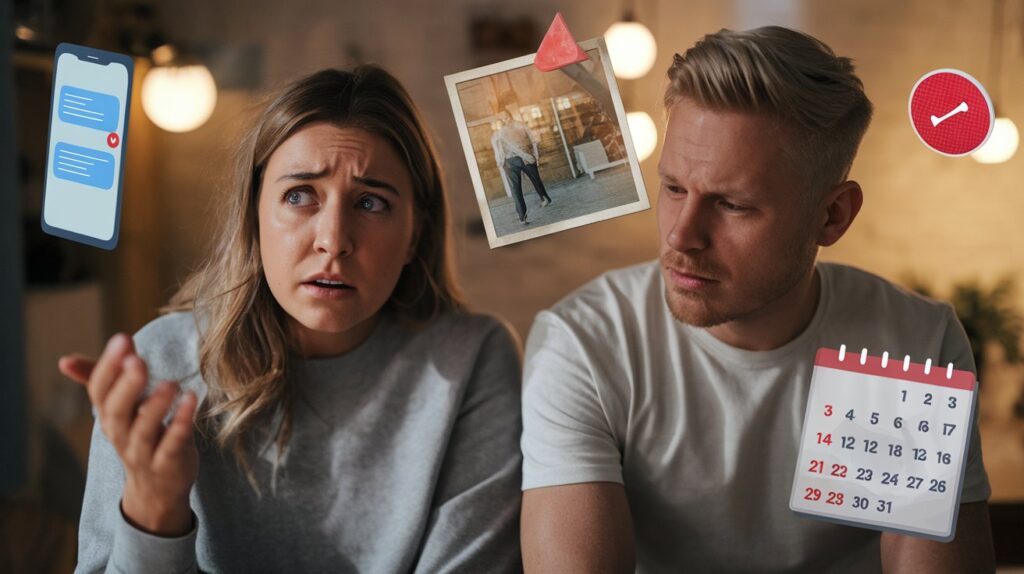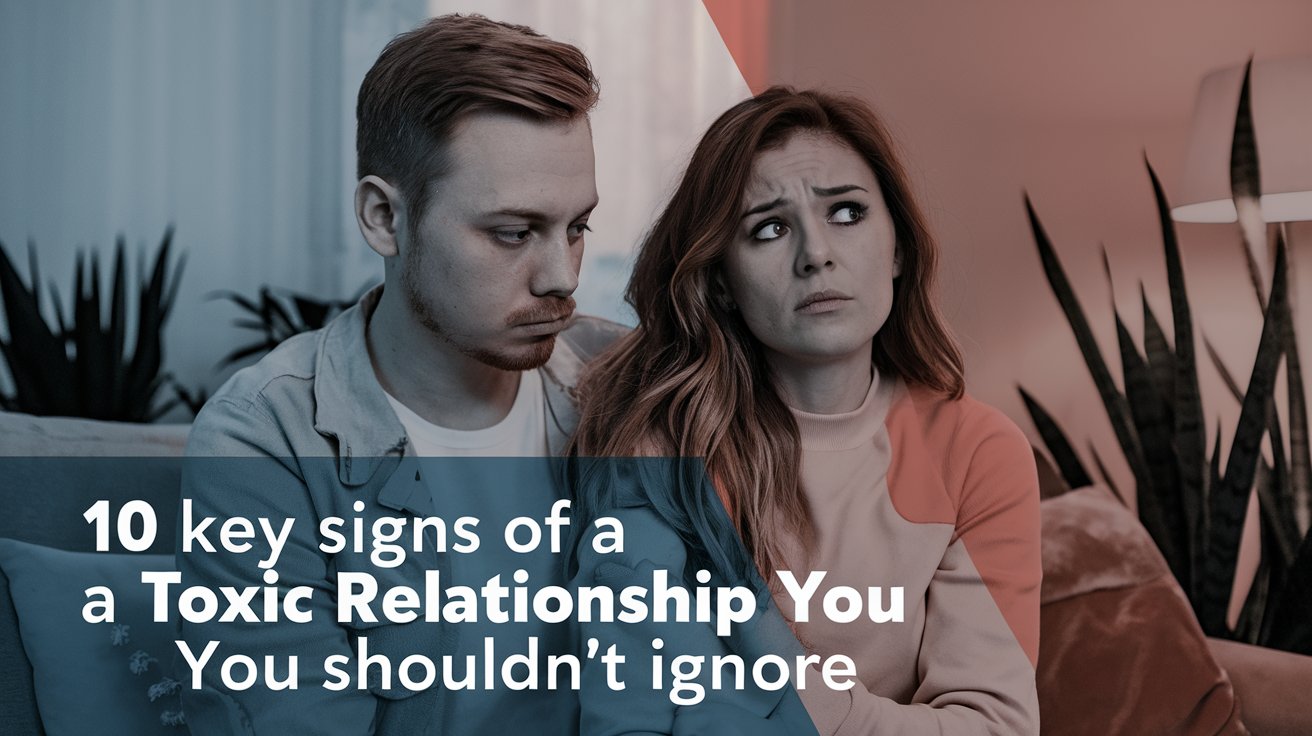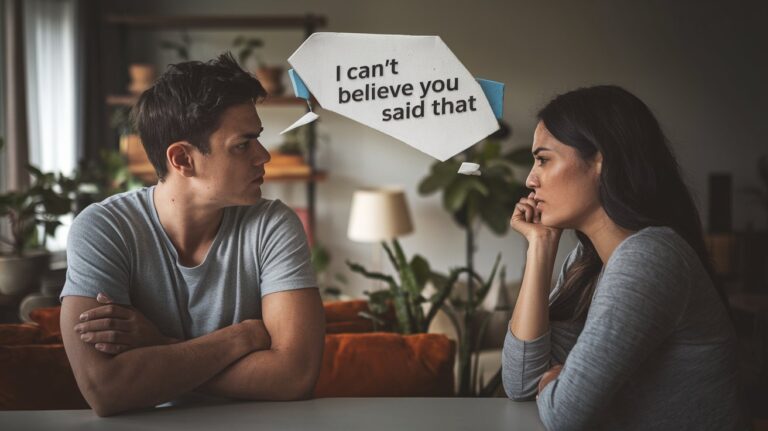10 Key Signs of a Toxic Relationship You Shouldn’t Ignore
Not every bad moment in a relationship means it’s toxic, but recognizing the signs of a toxic relationship is essential for your emotional well-being.
Do you feel drained, belittled, or controlled instead of supported and loved? Toxic dynamics often sneak in subtly—through controlling behavior, constant blame, or broken trust—until you feel trapped.
If any of this sounds familiar, it’s time to take a closer look at your relationship and decide what’s best for you. Let’s explore the Initial Toxic Relationship Signs and how you can reclaim your peace.
Table of Contents
Initial Toxic Relationship Signs

Understanding the signs of a toxic relationship can help you protect yourself. It’s important to notice when things aren’t right.
Unhealthy Communication Patterns
When talking feels like walking on eggshells, that’s a red flag. Constant yelling, blaming, or silent treatment are forms of unhealthy communication.
Communication should feel safe and respectful. If they attack you with words or ignore you, it might be time to look closer into how to let go of a toxic relationship.
Controlling Behavior
Control can be subtle or obvious. Do they keep track of what you do, who you see, or where you go? Maybe they make decisions for you and dismiss your opinions.
Their need to have power over you isn’t love; it’s control. Recognizing controlling behavior is important for toxic relationship recovery. Here are some common controlling behaviors:
- Checking your phone without permission.
- Isolating you from friends and family.
- Making you feel guilty when you make your own decisions.
Lack of Respect and Trust
Respect and trust are pillars of any healthy relationship. If these are missing, heartbreak is often close behind.
Do they belittle you, lie, or breach promises? A lack of respect and trust erodes your self-worth and well-being.
| Behavior | Description |
| Belittling | Making cruel jokes or putting you down. |
| Lying | Dishonesty about big or small things. |
| Breaking Promises | Not keeping their word consistently. |
These signs are serious. If you recognize them, it might be time to consider moving on from a toxic relationship and focus on healing from a toxic relationship. Reclaim your peace and happiness.
Knowing When to Let Go

Acknowledging Your Feelings
Understanding your emotions is the first step toward liberation. It’s okay to feel sad, angry, or confused. Your feelings are valid.
Take a moment to sit with your emotions. Write them down, talk to a friend, or just think it through.
Recognizing that you feel this way because of a toxic relationship is crucial. This is your inner voice telling you something isn’t right.
Setting Boundaries
Boundaries are essential for your well-being. They let others know what is acceptable and what is not. In a toxic relationship, boundaries are often ignored.
To set boundaries, decide what you can tolerate and what you cannot.
Communicate these clearly to the other person. It’s okay to stand up for yourself. Saying “no” does not make you a bad person. It means you respect yourself.
Seeking Support
No one should go through this alone. Support from friends, family, or a counselor can make a huge difference. They can offer a new perspective and advice.
Sometimes just talking about your situation can help you see things more clearly. For more about getting help, read our article on healing from a toxic relationship.
| Support Type | Benefits |
| Friends & Family | Emotional support and perspective |
| Support Groups | Shared experiences and understanding |
| Professional Counseling | Expert guidance and coping strategies |
| Online Communities | Anonymous support and advice |
Realizing when to let go can be challenging. But knowing your feelings, setting your boundaries, and seeking support are steps in the right direction. For more information, visit our articles on how to let go of a toxic relationship and toxic relationship recovery.
Moving On from a Toxic Relationship

Taking Time for Yourself
It’s important to take time for yourself after leaving a toxic relationship. Give yourself space to breathe and think. Focus on your own needs and feelings.
Reflect on what you’ve been through and what you’ve learned. This time alone can help you understand your emotions better.
Taking time for yourself means different things for different people. Some might enjoy a quiet walk in the park, while others might find peace in reading a book.
Do what feels right for you. Also, don’t rush into another relationship. Allow yourself to heal first. For more tips, visit moving on from a toxic relationship.
Focus on Self-Love and Healing
Self-love is key to healing from a toxic relationship. Start by treating yourself with kindness. Say positive things to yourself.
Write down things you like about yourself and read them often. Doing this can boost your self-esteem.
Healing takes time. It’s okay to feel sad or angry. Allow yourself to feel these emotions. But don’t stay stuck. Engage in activities that make you happy.
This could be a hobby or spending time with friends who make you feel good. For more advice, check out healing from a toxic relationship.
| Activity | Benefit |
| Journaling | Helps process emotions |
| Exercise | Boosts mood and energy |
| Meditation | Reduces stress and anxiety |
| Art or Music | Provides creative outlet |
Engaging in Healthy Relationships
Once you start feeling better, it’s important to engage in healthy relationships. Surround yourself with people who respect and support you. Healthy relationships bring joy and peace, not stress and anxiety.
Take time to rebuild trust. Open up to friends who have always been there for you. Meet new people with positive energy.
Learn to set boundaries and communicate openly. These steps will help you thrive in new relationships. For more on this topic, read toxic relationship recovery.
Moving on from a toxic relationship is a journey. It involves taking time for yourself, focusing on self-love, and engaging in healthy relationships.
These steps will help you heal and grow stronger. For more guidance, visit how to let go of a toxic relationship.
Embracing Healing

Healing after a toxic relationship can feel challenging. Yet, taking steps like seeking therapy, practicing self-care, and finding inner strength can help.
Therapy and Counseling
Talking to a therapist or counselor can be very helpful. They are trained to listen and offer advice. Therapy gives a safe space to share feelings.
It makes understanding the past easier and helps to make better future decisions. Many find therapy a key step in healing from a toxic relationship.
| Type of Therapy | Benefits |
| Individual Therapy | Personal attention and care, tailored advice |
| Group Therapy | Sharing with others, mutual support |
| Online Counseling | Convenient, accessible from home |
Practicing Self-Care
Taking care of oneself is crucial after leaving a bad relationship. Self-care includes activities that relax and rejuvenate.
It can be as simple as taking a long bath, reading a good book, or doing some exercise. Self-care helps to rebuild confidence and happiness.
Some easy self-care tips:
- Take time off for hobbies
- Maintain a healthy diet
- Get enough sleep
- Spend time with positive people
Finding Your Inner Strength
Believing in oneself is powerful. It takes courage to leave a toxic relationship. Remind yourself of this strength daily. Engage in activities that boost confidence.
Think positively about the future. Everyone has an inner strength, sometimes it just needs to be rediscovered.
Journaling can also help. Writing down thoughts and goals can provide clarity. It helps track progress and reflects on personal growth. Inner strength comes from believing in oneself and working towards a better future. For more ideas on recovery, see our article on toxic relationship recovery.
By embracing these steps, healing becomes a journey of self-discovery and growth. Seeking therapy, practicing self-care, and finding inner strength are fundamental parts of moving forward.
Flourishing After Toxicity

Once free from a toxic relationship, one can start to rebuild and flourish. It begins with rediscovering self-worth, setting positive intentions, and thriving in healthy relationships.
Rediscovering Your Worth
After leaving a toxic relationship, it’s normal to feel lost. They should take time to remember who they are. They can start by focusing on what makes them unique and valuable.
Reflecting on their strengths and passions helps. Writing down achievements and kind words received from others can also help boost confidence.
| How to Rediscover Worth | Examples |
| Reflect on strengths | Make a list of personal strengths |
| Focus on passions | Engage in hobbies or activities they love |
| Remember achievements | Write down past successes |
| Gather positive feedback | Collect kind words from friends and family |
Setting Positive Intentions
It’s important to focus on the future. Setting positive intentions can guide the healing process. They should think about what they want in life and future relationships.
Setting clear, positive goals helps to stay focused on what truly matters.
Ideas for positive intentions:
- Prioritize self-care and mental health
- Build strong, healthy boundaries
- Seek relationships based on mutual respect
Thriving in Healthy Relationships
Entering new relationships can be scary. But healthy ones are built on trust and respect. They should seek relationships where they feel valued and safe.
It’s helpful to recognize the signs of a toxic relationship to avoid repeating the past.
Looking for these signs can guide them:
- Open and honest communication
- Mutual respect and trust
- Support for personal growth
By rediscovering self-worth, setting positive intentions, and seeking healthy relationships, they move towards a brighter future. For more steps on moving on from a toxic relationship and healing from a toxic relationship, check out our related articles.








One Comment